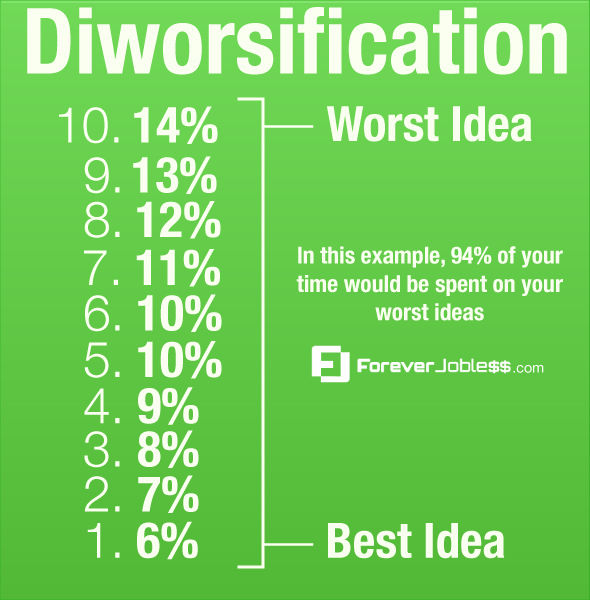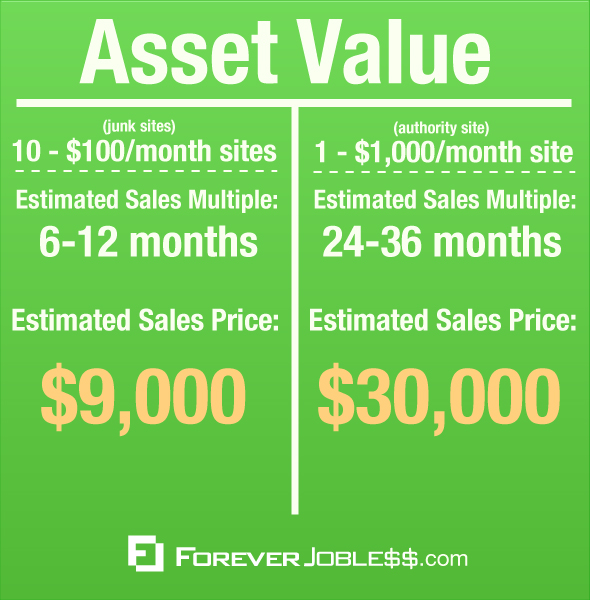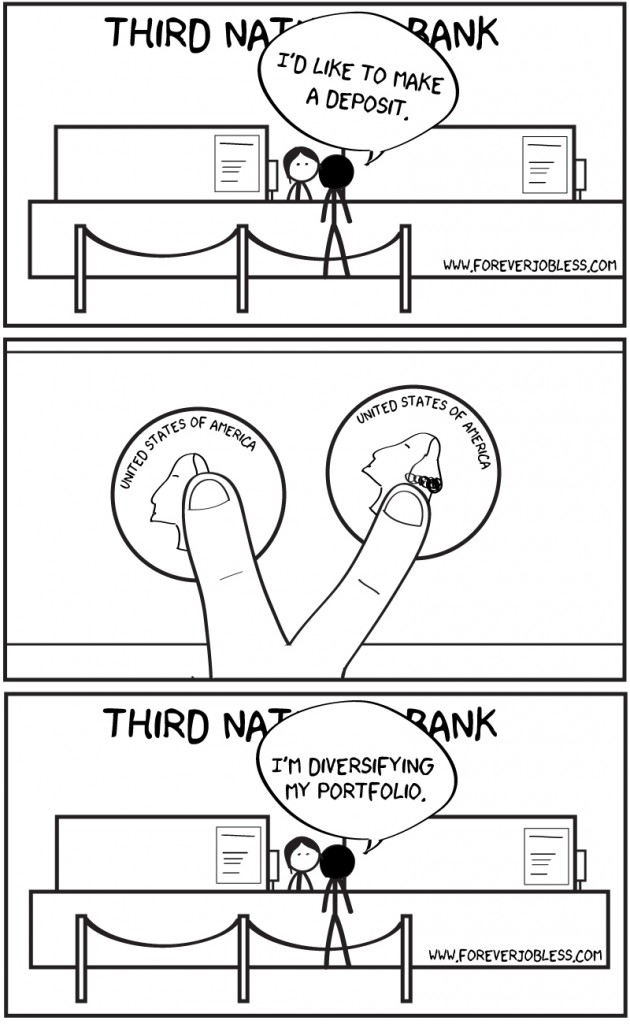“There’s no reason to have a plan B, because it distracts from plan A”
I would have never been able to become a professional poker player if I had also been trying to be a professional day trader, an SEO wizard, and other things that might have interested me at the time. I wouldn’t have had the time or the knowledge to be really good at any one thing, if I was doing them all. Instead of being really good at poker, I would have just been mediocre at a lot of things.
I had a lot of business ideas I wanted to try before I finally decided on starting BlueFirePoker. It never would have had the success it did, if I had started several of my other ideas at the same time.
Why am I telling you this?
Well, if you’re like many other aspiring entrepreneurs, you have a lot of ideas. The problem is, instead of picking one and crushing it, you are one of the many making the huge mistake of trying to do them all at the same time.
“But, I thought I was diversifying….”
No, you’re misapplying that concept. Stop before you waste any more years spinning your wheels.
“What if I do a bunch of small websites instead of one big website, so it won’t be as risky. I shouldn’t do that?”
No, you shouldn’t do that. The logic that it might be less risky is baffling, yet many seem to share this idea.
Is it necessarily wrong? Well, technically no — I mean, it’s really a personal preference when it comes down to it, however, as with most situations in business, there’s an optimal and a suboptimal route you can choose.
The optimal route is rarely the one chosen, because it often seems like the “risky” route.
In this post I’m going to break down what diversification is and how it’s misapplied.
For people starting out, you should absolutely be focusing on one business, and not consider starting several.
Let’s get you on the right track.
Pat Flynn actually posted a question about this on his site last year: https://www.smartpassiveincome.com/website-diversification/
His question was: Would you rather have 1 site making $1k/month, or 10 sites each making $100/month.
A lot of the answers were similar to the mindset I see on forums and blogs all the time. Many people don’t have one successful business under their belt yet and are trying to start every site they can think of, all at the same time.
Remember what I said in the beginning about not having a plan B, because it distracts from plan A?
Many people are starting a plan A, B, C, D, E, F, G, H, I, J and not understanding why they never go anywhere.
Most aspiring entrepreneurs don’t know how to run a successful business, so instead of learning how to run 1 successful company, they start 10 unsuccessful companies and call it “diversification”.
If people are only attempting to make $1,000/month, it often means there is a substantial amount of business fundamentals that they need to learn, and if they’re attempting to do 10 things at once, they won’t be learning them. They’ll be too busy to learn where they’re failing and how to fix it.
Also, if someone focuses on 1 idea, they can put 100% of their effort into that idea. Instead, many people are dividing their effort into their 1st through 10th best ideas, with an average of 10% on each. However, if their goal was to make $100/month on each site, that’s not a good goal because in reality what that means is they’ll actually be spending less than 10% of their efforts on their best idea, and more than 10% of their efforts on their worst idea, since their worst idea will be harder to have be successful.
If they instead focused 100% of their effort on creating a $1k/month business, they can then choose to scale that to $10k/month if they wanted. If they attempted to start 10 $100/month sites, they wouldn’t even know which sites had the potential to turn into a real business yet. So they waste all their time on a bunch of junk sites instead of their best idea.
It’s absolutely fine to run a test on a handful of projects to see which you think will be best to start up. But to actually start up 10 things without knowing how to do 1 correctly yet, is absolute insanity.
Not to mention, if you do something great for one of your sites, whether it be a successful PR campaign, or whatever it may be, you’ll have to do 10 of them to have the same impact on the other sites. Let’s say you do a great promotion and increase a site’s business by 20%. Well, if you’ve got 10 sites, you realize all that work you did only increased your overall business by 2%. That sucks, especially for tiny startup businesses where the numbers are so small to start with. 2% growth on a tiny company is just 2% less tiny.
It’s about as efficient a way of getting money as going to the bank to withdraw $10k, and taking a bunch of pennies out to your car a handful at a time.
Also, you’ll have to spend 10x as much time researching the competition to stay ahead of them. Most people’s reaction’s to that are, “well, I don’t have to since I have the other sites to fall back on if something happens.”
Building a shitty business where you have no time to see what competitors are doing is not a business you want to “fall back on”.
“That makes sense. But if Google ever penalizes my only site, don’t I lose everything?”
This is the main concern everyone with an internet business seems to have. But if you have a real business, you aren’t 100% dependent on Google.
“But what if Google DOES penalize my site?”
Most people convince themselves that they should run a lot of sites in case Google penalizes some, so they’ll still have others that are making money. Well, people that think this way are playing the game not to lose, instead of trying to win it. They’re taking what they view as a non-risky route, instead of a route that enables them to make the most money. The funny thing is, the route they’re choosing doesn’t actually protect them from a risk standpoint at all, and in my opinion is probably a lot riskier.
First off, the fact that almost everyone’s immediate question revolves around Google is the scariest part. That fact alone shows that no one is considering, or even understands how to build a business that might not be 100% dependent on Google.
That’s a scary thought, and probably the most obvious thing that stands out to me as a lack of understanding what a real business might look like. If you’re basing your entire direction off of what Google might theoretically do, you need to take a step back and realize it’s more important than ever for you to learn how to build a real business.
Google should not be the determining factor on whether you make money or not. Your business abilities should. If you don’t have these skills, do you really think starting 10 shitty sites is going to help you acquire them? It’s not.
Plus, most people with 10 shitty sites are using the same traffic and monetization strategies on every single one. Do you really think that’s good diversification? It’s silly if you do.
A lot of people say the reason they wouldn’t start 1 site, is because they don’t want to put all of their eggs in one basket. You don’t HAVE any eggs, let alone a basket at this point. Focus less on scrambling around on this egg hunt trying to fill your basket and more on putting things that are worth something into it. The easter bunny would not deliver most of the shit you’re putting in there.
I prefer something more along the Warren Buffet mentality of putting all of your eggs in one basket, and watching that basket very closely.
Diversification is fine, but if you’re at the stage where you’re trying to create your first $1k/month, you should NOT be focusing on diversifying. What the heck do you have to diversify?
Most of the people who are saying “don’t keep all your eggs in one basket” are just regurgitating shit without really knowing why they’re saying it. They fear losing money, and heard some shit that sounds smart so they just repeat it as if it’s relevant to their situation, all the while racking their brain over why they just can’t seem to make any money.
It’s like the guys who invest in 147 different stocks. They like to think it proves they know how to manage their money and diversify their portfolio. The only thing it proves is that they have no idea what they’re doing.
It’s not going to be “less risky”. The risk is that you’re going to be wasting so much time on shitty sites, instead of spending it building a real business.
“Why would that be risky? Say, for example, I know SEO — why wouldn’t I just do that on a bunch of sites?”
As I mentioned before, if you’re attempting to build a real business, you shouldn’t focus 100% on SEO. Is it wrong to START a business by focusing on SEO. No, not necessarily. I’ve done it myself, and would consider doing it again if the opportunity made sense to do so.
However, if your whole plan on any business is to drive traffic through SEO, chances are you’re not building a real business.
There’s SEO, there’s PPC, there’s Facebook advertising, there’s selling on ebay, there’s selling on amazon, there’s google products, there’s social media marketing through your FB and twitter channels, there’s sales through affiliates… the list goes on and on. These are just a handful of methods if you’re selling a product. We haven’t even touched on all the ways to monetize other types of businesses.
Increasing your sales and marketing channels—within one business—will help you build a brand, and build authority in your space. You can’t build a brand, or authority for your business if all your efforts are divided by 10.
A business that has authority in its space is going to have a LOT more value if you ever go to sell it.
Most often, the only type of sites people have time to create if they’re working on 10 at once, are generic sites with very little value.
People don’t pay much for those.
They will pay more for a business that has authority.
“Why will a buyer pay more for an authority business?”
A buyer will have the same concerns about risk/diversification as you will have. If they’re thinking of buying your business, do you think they’d rather buy 1 business that has a killer brand, big social media presence, dominance in the niche, multiple streams of income, or 10 random sites with none of that? A dominant business is going to be worth a lot more to a buyer than a collection of businesses with little to no value. Without any authority, the others could fall apart and be worth nothing at any time. A competitor can’t come in and replicate your authority business overnight. But they can easily make a better site in any of the 10 spaces you’re in, causing that stream of income to be negatively impacted or wiped out altogether. This clearly impacts the overall asset value.
You WILL have an asset with resale value if you build a beast of a business. If you go the other route, do you really think you have an asset someone is dying to buy? Of course not.
“But can’t I outsource most of the work and still have 10 sites?”
That’s a nice thought… but then you’re going to be spending time finding/managing va’s instead of on making money. The more time you waste managing/randomly doing other “chores” that don’t equal money, is poorly spent time. ESPECIALLY if you haven’t created your first successful one yet. A lot of newbies are trying to be moguls with a million sites rather than making 1 actually work first.
“So where do I start?”
Knowledge is the #1 thing at this stage in the game for you.
You’re going to learn a lot more trying to create a legit business that can make money, rather than trying to figure out the latest spam techniques and “diversifying” your spammy shit across multiple sites. Stop thinking like broke bloggers.
“Is it okay if I just spread my risk to maybe 2 or 3 sites?”
I’ve said it before but it’s important enough to say again– diversifying when you’re talking about such small numbers is the silliest thing ever.
If you make $5 do you put it in your pocket or do you diversify and put 50 cents under the mattress, 50 cents in the stock market, 50 cents in the bank, etc… Your thought process is crazy. You don’t have anything to diversity yet, you’re WAY to early in the game.
Get KNOWLEDGE. People building these shitty sites don’t acquire the knowledge they need to build a real business. They’ll have to learn something totally new when they want to start making real money and create a real business. Even if it takes a little longer to learn the knowledge and execute building a real business, that knowledge will stick with you. One route gives you skills you can build on, one route doesn’t.
10 pieces of trash, is still trash… you have to decide – would you rather be a garbageman or a businessman?
I know a lot of people who used to run a huge amount of sites. They made a little bit on each one, and just pumped out more. Most of their sites don’t make money anymore because Google decided the quality wasn’t any good. Since they relied 100% on one strategy, and they didn’t have control(Google did) it’s often going to wipe out an entire strategy when Google makes a change. If they had built 1 site they could have spent all their time building a high quality authority site, which would be much more resilient to the Google gods.
As I’m writing this, a friend I haven’t talked to in a while skypes me to catch up, and mentions he lost a bunch of $5k/month income sites due to the latest Google updates. It happens at every level. If he had 1 monster site instead of a bunch of smaller sites, would he be in the same situation? No.
I got hit by the same updates. I had a collection of e-commerce stores doing around $40k/month revenue, and got chopped down to around $20k/month overnight after the Google changes. The business was mainly built on SEO, so we felt the hit pretty good. If instead of having a bunch of sites under that business, I’d focused on building 1 big authority site, I guarantee there’s a substantially less chance the site would have been affected.
Something that no one will think about when making a decision like this, and ought to be considered… your network.
What do I mean by that?
You’re substantially holding yourself back from expanding your network if you’re focusing on shitty little sites. The only people you’ll be able to relate to are other shitty site owners. You won’t have any real connections with people doing real businesses. The beauty of having a good network is, as you grow, your network grows and progresses as well. Many people move up to bigger and bigger deals, and it helps to be associated with people like that and see what type of big opportunities are out there. You can learn and grow along with other people you’re associating with. If you stay in the tunnel vision that is ‘shit marketing’, no one legit has any reason to want to associate with you. You don’t realize it, but you lose great connections because you’re not working on anything worthwhile. Call it, “networking opportunity cost.”
Long term, quality destroys quantity. It’s not even close.
Quality is not going to happen if a business is getting 10% of your efforts.
Focus on building a business where you can confidently say, “if I wanted this product/service, I would buy from this business over anywhere else”. If you’re building a business where you’re not able to say that, it’s probably time to re-evaluate what you’re doing.
If you’re doing things the same way most ‘make money’ bloggers are doing it, you’re doing it wrong.
If you change your route and it seems “risky”, consider that it might just feel unnatural because you’ve never done business the right way before.
–
If you found value in this post, please share it and leave a comment with your thoughts. 🙂



